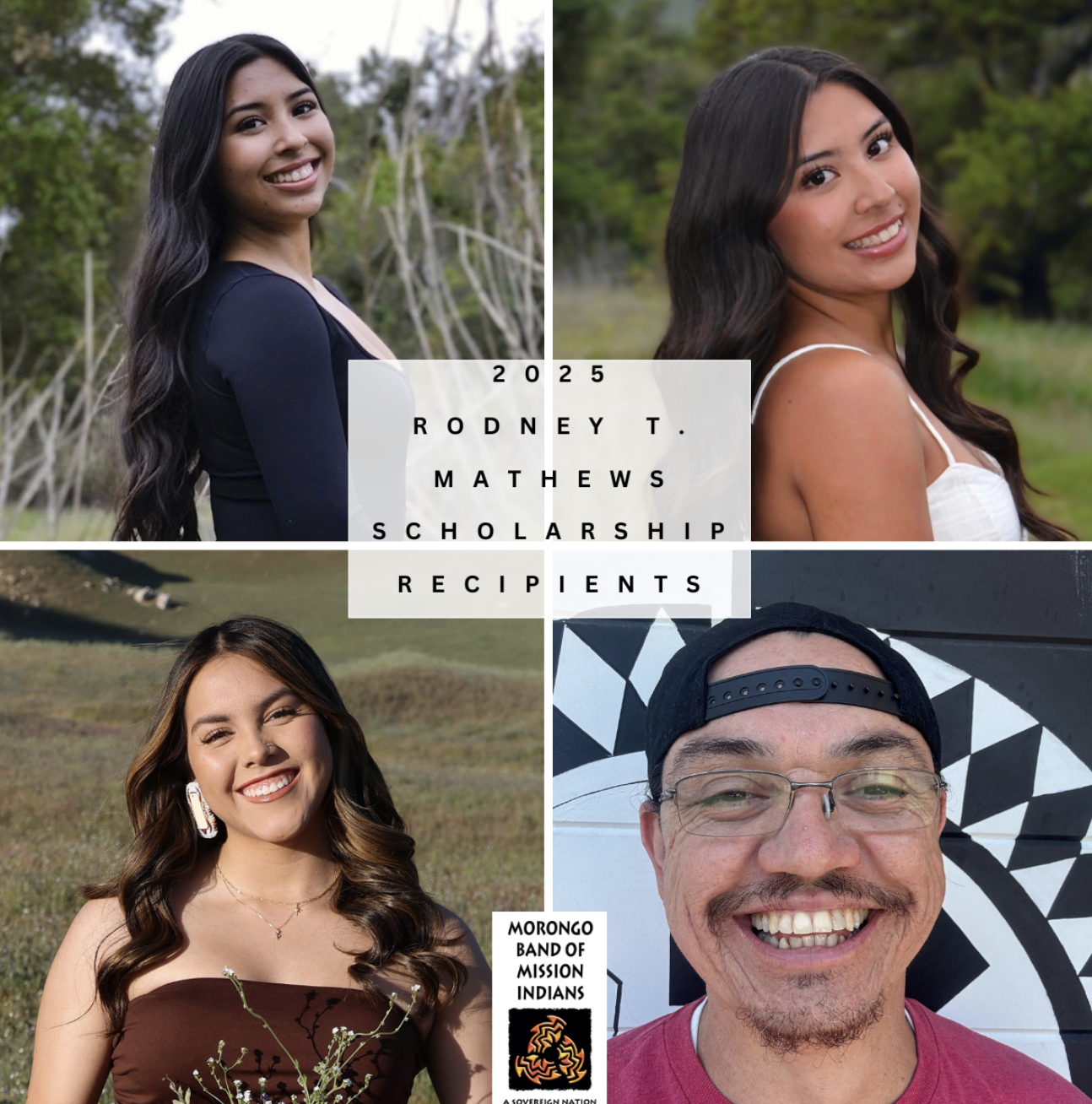
- Details
- By Native News Online Staff
Four Native American students from across the state have each been awarded a $10,000 scholarship by the Morongo Band of Mission Indians, located near Palm Springs. These awards were granted through the Tribe’s 20th Annual Rodney T. Mathews Jr. Scholarship Program.
Since its founding, the program has supported 66 Native students pursuing degrees at universities nationwide. Open to enrolled members of federally recognized tribes in California, the scholarship aims to help address the persistent underrepresentation of Native students in higher education—where American Indian and Alaska Native students still account for less than 1% of undergraduates in the U.S.
The 2025 recipients of the Mathews Scholarship Program include:
-
William Feather, a member of the Round Valley Indian Tribes, is pursuing a Doctor of Education (EdD) at Chaminade University in Honolulu. Residing in Ukiah, California, he works as a Special Education–Mental Health Counselor for the Ukiah Unified School District. His career goal is to become a school-to-prison prevention specialist and drive systemic reforms grounded in Indigenous knowledge and intergenerational healing. This marks his second time receiving the Mathews Scholarship, having also been selected in 2019.
-
Gabriella Salgado, a member of the Cahuilla Band of Indians, has spent her life on the Morongo Reservation in Banning. She is continuing her studies at California State University Monterey Bay with a major in Marine Science. Passionate about ocean life, she hopes to explore global marine environments and return home to educate youth about protecting ocean ecosystems.
-
Mary Pojas, a member of the La Jolla Band of Luiseño Indians, is currently working toward a bachelor’s degree in American Indian Studies at San Diego State University. Living on the La Jolla Indian Reservation in Pauma Valley, she aspires to a career in tribal law and leadership. She serves on her tribe’s Youth Council and participates in cultural exchange programs, traveling to share and preserve her tribe’s heritage.
-
Nusun Pojas, also a member of the La Jolla Band of Luiseño Indians, lives in Valley Center and will begin her studies at San Diego State University this fall. She plans to major in American Indian Studies with an emphasis on business and marketing. Her goal is to help build accessible healthcare services for her tribal community. Nusun has been involved in intertribal sports as both a participant and youth mentor and serves on the Youth Council.
The scholarship program was created in memory of Rodney T. Mathews Jr., a Morongo tribal member and graduate of Hastings Law School. Mathews worked as an attorney in Banning for two decades and served as a judge pro tem for over 10 years before his passing in 2004.
His mother, Eunice Mathews, noted that the scholarship reflects her son’s lifelong dedication to education and justice, and continues to inspire future generations of Native students to pursue their goals.
Scholarship selection is based on academic achievement and community involvement. To be eligible, applicants must be full-time students at accredited colleges or universities, complete 60 service hours with a designated California Indian agency, and actively engage in the Native American community.
More Stories Like This
Bard College Center for Indigenous Studies (CfIS) Hosts Annual Symposium With Keynote Speaker Miranda Belarde-Lewis on March 9–10American Indian College Fund Announces Spring 2026 Faculty Fellow Cohort
Navajo Nation Signs $19 Million Diné Higher Education Grant Fund Act into Law
Dr. Shelly C. Lowe to Be Inaugurated as IAIA President March 26–27
Tlingit Language Courses Expand for Students to Learn With Families At-Home
Help us defend tribal sovereignty.
At Native News Online, our mission is rooted in telling the stories that strengthen sovereignty and uplift Indigenous voices — not just at year’s end, but every single day.
Because of your generosity last year, we were able to keep our reporters on the ground in tribal communities, at national gatherings and in the halls of Congress — covering the issues that matter most to Indian Country: sovereignty, culture, education, health and economic opportunity.
That support sustained us through a tough year in 2025. Now, as we look to the year ahead, we need your help right now to ensure warrior journalism remains strong — reporting that defends tribal sovereignty, amplifies Native truth, and holds power accountable.
 The stakes couldn't be higher. Your support keeps Native voices heard, Native stories told and Native sovereignty defended.
The stakes couldn't be higher. Your support keeps Native voices heard, Native stories told and Native sovereignty defended.
Stand with Warrior Journalism today.
Levi Rickert (Potawatomi), Editor & Publisher


